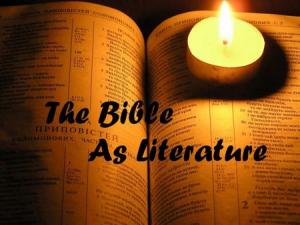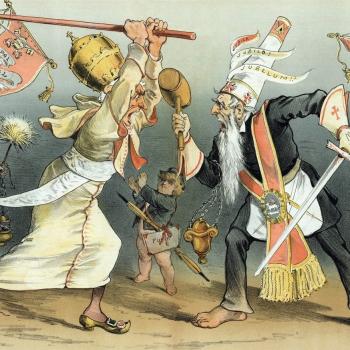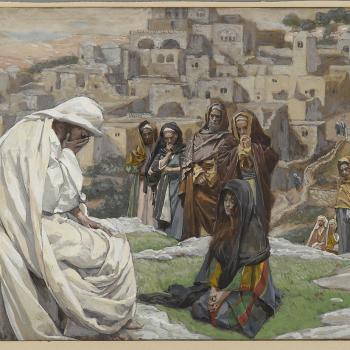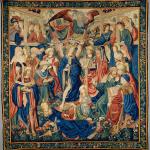This post is an introduction to a series of posts on Old Testament stories. The posts will appear on Mondays, Wednesdays, and Fridays, although Friday will often be a day to break from the series and consider something else. I call the series “Rowing with Michael: A Voyage through the Hebrew Bible in Rhymes and Commentary.” The reason for the title is at the end of this post. A Table of Contents with links to each post, which I insert here, was added after the series was complete. The Introduction follows the
Table of Contents.
- Introduction (below)
- The Bible’s First Leaders Weren’t Human
- New Clothes for Adam and Eve
- Sibling Rivalry and Abel’s (!) Sin
- Genealogies in the Bible: Old Folks, Hopeful People
- Noah’s Story: A World Saved and All the More Precious
- Babel’s Ecological Warning
- Abraham: What Kind of Story is He Father Of?
- Isaac’s Near-Death Experience: Did an Editor Save Him?
- Joseph of the Bible’s Dysfunctional Families
- The Exodus Story and Israel’s Pre-history, Part 1
- Exodus and History, Israel’s and Ours
- A Journey for People Away from Home or for People Already in their ‘Promised Land’
- Four Amazing Women in the Genealogy of Jesus
- The Problem of Biblical Violence, Part One
- Joshua Didn’t Destroy Jericho: The Problem of Biblical Violence, Part Two
- Revelation is a Dialogue with God’s Word: Biblical Violence, Part Three
- Solomon and Embracing the Symbol King
- Job and the Problem of Suffering, Part One: The Bible Tries Explaining
- The Problem of Suffering, Part 2: An Impatient Job
- Jonah Learns a Lesson: Chosen People, Part One
- Chosen People, Part Two: Paul’s Vision, a New Tribe?
- Liberation and the Bible: Chosen People, Part Three
Introduction: Stories in the Old Testament
I was attending a social gathering with some of philosophy professors and one of my teachers started telling this story:
My college senior class was voting on a class motto. Two choices were offered: “Knowledge is power” and “Knowledge for its own sake.” The votes were tallied and “Knowledge is power” won.
At this point, thinking I was very clever, I chimed in: “Which just goes to show knowledge isn’t power.” I got a dirty look from my professor, and it dawned on me that he was telling a joke. People tell stories, and normally we know what kind of story it is, but sometimes we don’t, and we can end up feeling foolish. I had just stolen my professors’ punch line.
When we read the Old Testament, occasionally we don’t know what kind of literature it is; but we do know one thing – it’s literature.

God made human beings, and God likes all the good that he put in us. Literature is one of the very good things. Let’s continue with literature for a bit.
No errors in the Biblel?
William Shakespeare wrote historical plays, and sometimes produced them in the royal palace for Queen Elizabeth I. After one such production the queen was especially pleased. She went to William and said, “I am King Richard II, am I not?” Shakespeare had written about long-ago King Richard II in such a way that the present queen could see herself.
An honored technique in literature is to write ostensibly about a historical person or event, but the reader knows the author is really making a statement about current events. (The TV series M.A.S.H. is a perfect example: stories set in Korean War times but with the 60’s and the Vietnam War in mind.) Sometimes stories are the best way for authors to say what they want to say about their world. Details are changed or made up. When that happens, we don’t put down the book and say, “This is lies.” It’s literature and sometimes good literature, and God is pleased.
Let’s imagine that happening in the Old Testament. I’m thinking of the story of Joseph and his 11 brothers. Imagine you’re a member of the tribe of Judah and you’re reading this story about the “olden days.” You notice that Judah, one of Joseph’s brothers, not only has the name of your tribe but he also seems to possess qualities you associate with your tribe. Let’s say that the author of the story did it deliberately, changing or making up details to make the story apply to today. Now do we say that the Bible contains errors? Or do we say people tell stories and God is OK with having stories in his book? Do we close the Bible in frustration? Or do we say the Bible is literature, sometimes very good literature, as in the case of the Joseph saga; and literature serves many purposes.
The Catholic Church says that Sacred Scripture teaches without error the truths necessary for our salvation. She doesn’t say that accurate historical or scientific information is necessary for our salvation. The Church says that God worked with human authors and their human characteristics and abilities. She doesn’t say that this procedure led to a perfect product in every respect. So we can rephrase the title of this piece:
People, with their human, imperfect, creative, sometimes odd (especially to us modern folk) ways, wrote the Bible, and God is OK with that.
Rowing with Michael
In this space for a while I will tell and comment on some stories from Jewish/Christian Scripture, aka the Old Testament. The commentary is meant to be a way of thinking about the Bible with some challenging questions in mind. These are questions that I imagine readers might ask if they take seriously the modern scientific worldview and matters of contemporary concern. Among these concerns I count the need for an environmental ethic, the moral claims of the world’s many and diverse cultures, war and peace, the claims of poor people, women, people of color, and so on. I do believe that the entire Bible applies to today and every age, whether its human authors intended it that way or not. I also believe that we approach the Bible not with an empty slate but with our human concerns in mind. Revelation occurs in the interaction between these concerns of ours and the literary legacy of the Bible.
Some might wonder: If the Bible applies to today, is its contribution positive or negative? The negative answer to that question is less likely if one pays attention to the way modern scholars deal with puzzling or troubling parts of the Old Testament. There are passages expressing a very high and challenging kind of justice right next to commands that don’t make any sense today. In the Old Testament God’s people fight wars that fail to meet church or even internationally agreed criteria for justice. There’s that famous passage in which God tells the humans to “have dominion” over the earth, which today suffers from far too much domination.
In the course of these commentaries, I pay attention to what modern scholarship on the Old Testament has to say. My acquaintance with this kind of study is that of a lifelong student and an amateur (and a lover as that word’s etymology has it). I necessarily risk mistaking a minority view for a consensus. I ask pardon further for compounding the risk by occasionally offering my own ideas. The Catholic Church tolerates a rather broad range of views on the Bible. I hope and intend to stay within that range.
Another pardon needs begging as I introduce each story in the coming series with a verse that you could sing, if you chose, to the melody of “Michael, Row the Boat Ashore.” That explains why I call the series “Rowing with Michael: A Voyage through the Hebrew Bible in Rhymes and Commentary.” You can decide whether the intentionally quirky verses or the attempt at serious commentary has the greater value.















